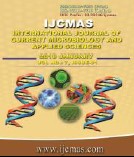


 National Academy of Agricultural Sciences (NAAS)
National Academy of Agricultural Sciences (NAAS)

|
PRINT ISSN : 2319-7692
Online ISSN : 2319-7706 Issues : 12 per year Publisher : Excellent Publishers Email : editorijcmas@gmail.com / submit@ijcmas.com Editor-in-chief: Dr.M.Prakash Index Copernicus ICV 2018: 95.39 NAAS RATING 2020: 5.38 |
A pot experiment was conducted under natural conditions of screen house to evaluate the effect of saline irrigation given at flowering stage on plant water status functioning and their tolerance in two chickpea (Cicer arietinum) genotypes viz. HC-3 and CSG-8962. The pots containing dune sand were saturated with Cl- dominated saline irrigation at (40-45 DAS) to maintain ECiw of 2.0, 4.0 and 6.0dS m-1 as compared to control. The control plants were irrigated with distilled water. The water potential (Ψw) of leaves, osmotic potential (Ψs) of leaves and roots and RWC of leaves and roots decreased significantly with increase in saline irrigation level from control to 6.0 dS m-1 at flowering stage.HC-3 showed more decline in water potential of leaves and osmotic potential of leaves and roots and RWC of leaves and rootsas compared to CSG-8962. Hence, the mechanism of salt tolerance was comparatively better in the HC-3 than in CSG-8962 as found from the physiological traits studied.
 |
 |
 |
 |
 |